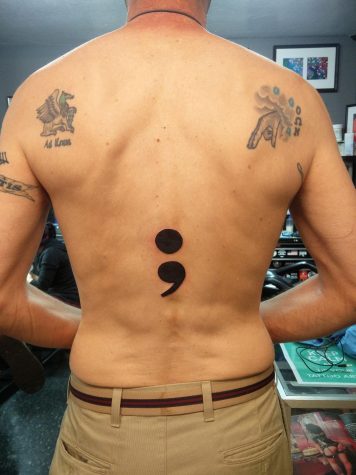Tattoos in Corporate America
Unknown; provided by Depositphotos and CreativeCommons
Do his tattoos seem to be preventing him from working in an office building?
February 28, 2022
“Hey, question: how do you guys feel about tattoos?” I asked a couple of classmates.
“I love tattoos!” Payton Tanner (10) said.
“I think tattoos are a great way to express personal identity,” Ian van Duursen said.
“I want to cover my whole body in patchwork tattoos,” Annamarie Burford (12) said.
All three of these students have a 4.0 or above GPA. But that’s the generation difference. Why do some still hate tattoos?

Medusa tattoos are symbols of women who have overcome a powerless situation. Medusa, in Greek Mythology, was given the power to turn men to stone as a curse from Athena for breaking a vow. She wasn’t supposed to marry but was raped and forced to marry Poseidon. Her struggle turned her into a symbol for women who have been raped or sexually assaulted. (DomCarterTattoo)
As students from Dakota Ridge High School graduate and move into the workforce, many are having to be more aware of their tattoos. There are students in the school that have professional tattoos and some that have stick-and-poke tattoos. But although they’re meaningful in most cases, jobs still have a right to turn you away because of them. Even some of the DRHS staff have tattoos.
In the workforce today, tattoos are becoming more accepted, but many older generations still associate tattoos with being part of a gang, being a biker, or being an outlaw. Which I find to be strange because there are plenty of people in high-paying jobs, or jobs with a lot of pressure to be “professional,” that have/had tattoos. It was even rumored that Andrew Jackson, Franklin D. Roosevelt, Theodore Roosevelt, Dwight D. Eisenhower, and James Polk had tattoos, according to Jobydorr.
It feels like tattoos should be more accepted considering how much of the population has them.
According to History of Tattoos in the United States, about 15% of men have tattoos, and 13% of women. Yet there will always be some employer that is willing to turn away a perfectly good candidate because they have a couple of tattoos.
Of course, there are certain tattoos that shouldn’t be allowed in the workplace. I don’t care how many someone has or where they are, but if they have anything to do with racism, homophobia, or anything else that is obviously offensive to a group of people, they shouldn’t be tattooed on someone. Honestly, that seems like common sense, but there are many people who tattoo swastikas or slurs on themselves to seem ‘cool’ or ‘hardcore.’
Other than that, I can’t find a viable reason as to why tattoos aren’t allowed in some workplaces. They’re a form of self-expression and in some cases are a coping mechanism. You never know what tattoos have what meaning and/or how important they are to someone. What you might see as a stupid or meaningless tattoo may be reminiscent of a loved one who passed.
Multiple studies have shown that freedom of self-expression creates better morale and more productivity. According to an article written by the Harvard Business Review, when an experiment on belonging at the workplace was conducted by BetterUp scientists, they found that the feeling of belonging was low but produces major benefits. When employees feel like they belong, there was a 56% increase in performance, 50% decrease in turnover risk, and 75% decrease in sick days. Doesn’t that sound like something most companies would want? A 10,000 person company would have over $52M in annual savings with these statistics.

Semicolon tattoos are representative of suicide survivors. Semicolons serve to end one thought and lead to another. The thought is that the “story isn’t over yet.” (Kencf0618 )
So why do companies insist on limiting self-expression? Dress codes are understandable, but tattoos? Those aren’t. If someone wants it permanently on them, let them have it. It’s not reflecting poorly on you, it doesn’t hurt you, and as long as it’s not a direct offense to a group of people, it shouldn’t matter.
Thankfully, as younger generations start to dominate workplaces, tattoos are becoming more accepted. Hopefully, by the time the majority of the students at DRHS are a part of cooperate America, they won’t have to worry about limiting their self-expression by hiding their tattoos.



